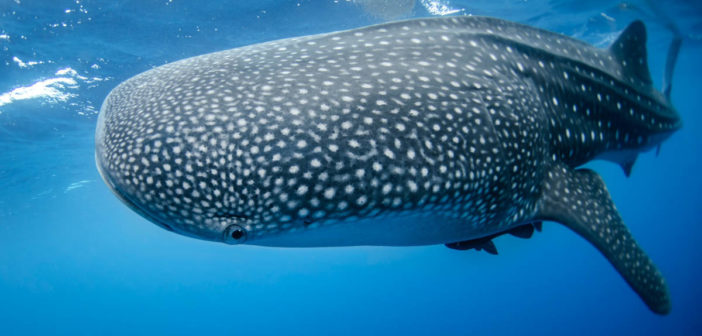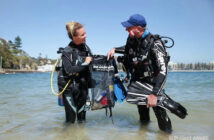Marine megafauna, or ocean giants, such as the whale shark, play a critical role in the health of our oceans’ vast ecosystems, and thus the survival of all marine life, so how about we learn a little more about them.
FACT 1
Whale sharks are actually sharks, not whales, which means they get the title of the largest fish in the sea! They can be as long as a school bus and can weigh up to 50,000 pounds! Despite their massive size and the “man-eating” title of shark, they are often referred to as “gentle giants,” as they are docile creatures that feed on small shrimp, fish and plankton.
FACT 2
Some form of the whale shark has existed for more than 70 million years! This means their existence overlapped with the Tyrannosaurus rex.
FACT 3
Whale sharks are one of three sharks that are filter feeders, which, as mentioned above, means one of their favourite meals is plankton. Instead of relying on teeth to bite and chew, they stretch open their colossal mouths (stretching to about four feet wide) and inhale a cloud of tiny plants and animals that happen to be around (this unfortunately includes floating plastic as well).
FACT 4
Whale sharks are found in all the temperate and tropical oceans of the world. In order to find enough food to sustain their huge size, and to reproduce, whale sharks travel large distances. This is usually pretty slow going, as they move at speeds a little less than 5 kilometres per hour. We could all take a lesson from a whale shark to live life a little slower.
FACT 5
These docile sharks are known for their characteristic spots and stripes, which form intricate patterns, like warriors painted for battle. Each marking is distinct and used by scientists to identify individual whale sharks, just like a fingerprint.
FACT 6
Though these marine giants often roam the oceans alone, a large number of them will gather in areas where there is an abundance of plankton. It’s in these areas where they become prime tourist attractions. However, unless managed properly, some whale shark tourism industries can interrupt feeding patterns and the sharks can be injured by boat propellers or harassed. If wanting to swim with whale sharks, be sure to use tour operators who care about this beautiful species!
FACT 7
Scientists believe that less than 10% of whale sharks born reach adulthood (30 years), but for those that do, they may live up to 150 years! This long lifespan, their migratory nature and slow reproductive rate, though super cool, make them more vulnerable to overexploitation by fisheries. They are targeted in many areas for their meat, oil and fins, are accidentally caught in fishing gear and are affected by habitat loss or degradation in the form of overfishing of reef fish. Fortunately, more and more countries are realizing that whale sharks are more valuable alive than dead and organizations, such as the World Wildlife Fund are supporting ecotourism projects around the world.
FACT 8
The full life cycle of a whale shark is still a mystery. Scientists have yet to properly document mating rituals and though through studies on shark biology it is known females give birth to live young, it has still never been observed. The search for answers has been so difficult because whale sharks are ranked one of the ocean’s most widely travelled species – travelling between open ocean, coastal waters and the deep sea. Now listed as Endangered on the IUCN Red List scientists feel like they are racing against time. Without knowing how, when or where a species breeds, how can they make informed conservation plans?
The stakes have never been higher for these ocean giants, which is why organizations like the Marine Megafauna Foundation are on a mission to save them using pioneering research, education, and sustainable conservation solutions.
Many artists and eco-responsible brands also love to use the iconic whale shark in their products as a way to advocate for their protection and conservation. The brand Waterlust goes a fin further by donating a portion of their profits from their Whale Shark Collection to the Marine Megafauna Foundation.
Follow Richelle on Facebook









